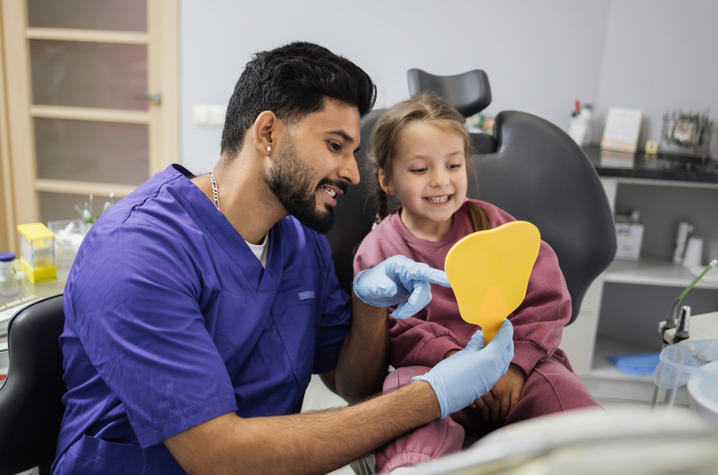Tips to keep your child's dental health in great shape

The University of Kentucky Public Relations & Strategic Communications Office provides a weekly health column available for use and reprint by news media. This week's column is by Cristina Perez, D.D.S., associate professor and chief, Division of Pediatric Dentistry in the UK College of Dentistry.
LEXINGTON, Ky. (Feb. 12, 2024) — Children’s dental health is important all year long. February is recognized as National Children’s Dental Health Month which reinforces the importance of children’s oral health and raises awareness of pediatric dental care.
According to the American Dental Association, cavities and tooth decay are the most common chronic dental conditions of childhood. More than 40% of children have untreated tooth decay by the time they enter kindergarten and are three times more likely to miss school because of dental pain.
Poor oral health or untreated cavities can lead to dangerous infections in children and may lead to problems with eating, speaking, playing and learning.
The good news — cavities are preventable. Parents can take simple steps to help their child start the journey of a healthy smile for a lifetime.
Newborns and babies. Start cleaning your newborns gums with a clean cloth twice a day. This ensures no bacteria or yeast stay on soft tissue and gets your baby used to cleaning their mouths. Then begin brushing when the first tooth appears, using only a small, soft, prickled brush and about a grain of rice-sized dab of fluoride toothpaste. Fluoride fights against bacteria and strengthens the tooth's enamel, protecting it from cavities. Don’t forget to also move the brush onto the gums with circular motions to clean keep your baby’s gums healthy and avoid gum disease.
Children. As your child grows up, they should be getting routine checkups from a dentist every six months. Brushing twice a day for two minutes every day will prevent cavities and protect your teeth from leftover sugars. If your child is under the age of 8, make sure you are supervising and helping them during brush time. They are more likely to clean their teeth effectively with an adult present.
Once your child’s teeth are touching it’s time to start flossing. Bacteria and sugars can get stuck in between the ridges in our teeth and break down enamel, leaving more vulnerable teeth open for tooth decay.
Healthy habits. To prevent decay as much as possible, make sure your children stay hydrated. Tap water is the best for your teeth. Sugary drinks or juices are serious threats to your teeth, and limiting the amount or leaving these drinks to meal times only will defend against the possibility of cavities.
This also applies to snacking. Try to avoid sticky and sugary snacks. (Chocolate is recommended over gummy candy that can get lodged in between the teeth.)
Instead, give children calcium-rich snacks like cheese or low-fat yogurt. Many candies, sports drinks and fruit snacks have harsh sugars that can damage and weaken your teeth.
Risk factors. Look out for risk factors that your child might be more susceptible to cavities. A family history of cavities could mean your child is more prone to developing them. If your child wears braces or oral appliances make sure they clean their appliance and floss and brush after meals.
If any of these apply to your child, be sure to talk with your dentist.
UK HealthCare is the hospitals and clinics of the University of Kentucky. But it is so much more. It is more than 10,000 dedicated health care professionals committed to providing advanced subspecialty care for the most critically injured and ill patients from the Commonwealth and beyond. It also is the home of the state’s only National Cancer Institute (NCI)-designated Comprehensive Cancer Center, a Level IV Neonatal Intensive Care Unit that cares for the tiniest and sickest newborns and the region’s only Level 1 trauma center.
As an academic research institution, we are continuously pursuing the next generation of cures, treatments, protocols and policies. Our discoveries have the potential to change what’s medically possible within our lifetimes. Our educators and thought leaders are transforming the health care landscape as our six health professions colleges teach the next generation of doctors, nurses, pharmacists and other health care professionals, spreading the highest standards of care. UK HealthCare is the power of advanced medicine committed to creating a healthier Kentucky, now and for generations to come.




